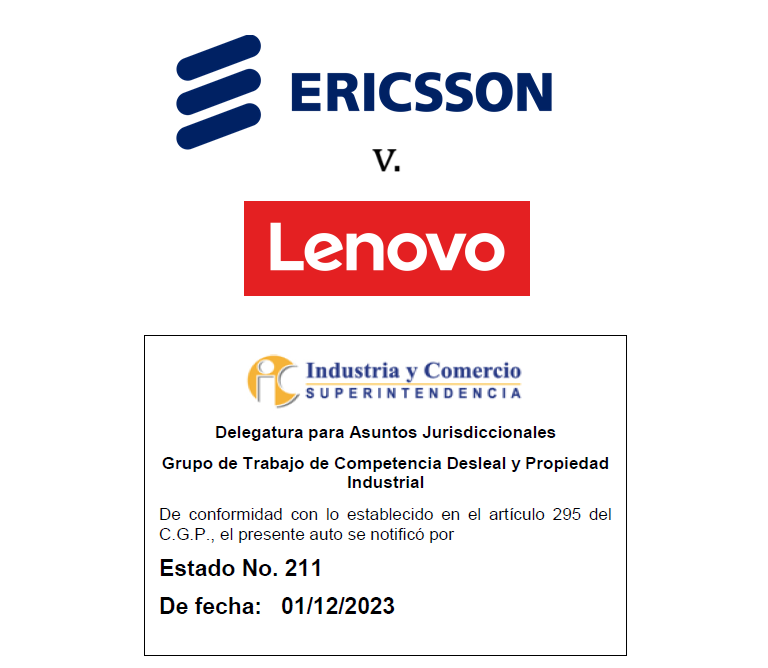Context: In October 2023, Ericsson confirmed a multi-jurisdictional patent enforcement effort against Lenovo, and it became known last week that Ericsson has obtained several preliminary injunctions against Lenovo in Colombia and Brazil (Managing IP (paywalled)).
What’s new: The reasoning behind the Colombian decisions, of which ip fray has obtained copies, suggests Ericsson was a willing licensor but Lenovo not necessarily a willing licensee.
Direct impact: Ericsson enforced a 2022 Colombian PI against Apple for several months, the equivalent of which could force Lenovo’s Motorola phones out of the Colombian market, on top of making Lenovo come across as an infringer.
Wider ramifications: Certain Latin American jurisdictions become increasingly attractive venues for patent and particularly SEP enforcement while some EU policy makers would like to discourage such actions in the 27-member bloc.
Just in time for the Christmas selling season, Ericsson dealt Lenovo several blows in Latin America, approximately a year after similar results against Apple. The dispute with Apple settled shortly thereafter, but presumably due to a variety of factors. At the time, Brazilian consumers had not yet been impacted, and the Colombian preliminary injunction (PI) had just been lifted. In the Lenovo cases, Ericsson again relied on the local firms that had succeeded against Apple: Brazil’s Licks Attorneys and Colombia’s OlarteMoure.
On December 6, the Superintendencia de Industria y Comercio (Superintendence for Industry and Commerce), which is part of Colombia’s Ministerio de Comercia, Industria y Turismo (Ministry for Commerce, Industry and Tourism), issued a press release (in Spanish) confirming that it has exercised its judicial role and prohibited the sale of eight different series of Motorola phones in the Colombian market.
There are three parallel decisions by the governmental body, each dated November 30, 2023, and over a different patent declared essential to the 5G standard:
- auto no. 139956 barring Motorola Mobility’s Colombian subsidiary from selling phones accused of infringing Colombian patent no. 38001
- auto no. 139530 barring distributor Ingram Micro S.A.S. from selling phones accused of infringing Colombian patent no. 37362
- auto no. 139981 barring wholesaler MPS Mayorista de Colombia S.A. from selling phones accused of infringing Colombian patent no. 36031
The orders clarify that resellers are not the original culprits, but that they, too, must respect valid patent rights and are not allowed to distribute infringing products. As long as Lenovo isn’t licensed, distributing its unlicensed products is unlawful.
Based on the information provided by Ericsson’s attorneys, the Colombian government agency assumed, for the time being, that Ericsson discharged its obligations to grant a license to those SEPs on fair, reasonable and non-discriminatory (FRAND) terms. The problem appears to be on Lenovo’s side.
In order to enforce, Ericsson must make certain deposits. Each order states an amount that is the equivalent of approximately US$230,000.
Against Apple, Ericsson’s Colombian counsel filed cases in a variety of venues. Presumably there is now the potential for additional Colombian injunctions against Lenovo anytime. Interestingly, Apple argued that the only proper venue is the very Superintendence that has now issued the three PIs against Lenovo.
For Lenovo, Latin America is a strategically important market in which its Motorola brand (which it acquired from Google in 2014) enjoys a strong reputation. There are obviously larger markets, but patent holders seeking leverage over licensees rejecting their offers should not underestimate Colombia’s significance. The country has a population of more than 50 million and ranks #43 by nominal GDP, ahead of countries like Finland (#48) and New Zealand (#53), and pretty much at a level with South Africa (#41).
The European Union’s legislative process may or may not lead to the adoption of the proposed SEP Regulation in the near term. Even if so, it might prove inconsequential and/or there could be substantial delays before it actually enters into force. In the meantime, prudent SEP holders will pursue venue diversification in order to
- build the relevant in-house expertise,
- form working relationships with local counsel and
- contribute to the development of SEP case law in those jurisdictions.
Given the wide discrepancy in unit sales volumes between Ericsson and Lenovo as well as the well-known strength of Ericsson’s patent holdings in certain fields of technology that are at the heart of Lenovo’s business, it is obvious that the latter will be the net licensee. Lenovo has recently brought an enforcement action of its own against ASUS, which started that dispute in August 2023.
To Read The Full Story
Continue reading your article with a Membership

